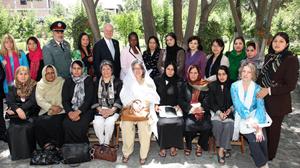The participation of women and girls in today's Afghanistan is more crucial than ever in shaping the nation of tomorrow.
KABUL - Women in Afghanistan are taking their places at all levels of society. All Afghans should be proud of national women’s strength, commitment and contributions to the betterment of this country. However progress achieved by Afghan women in the past decade is vulnerable. It is up to all Afghans to make certain that the urgent strides for reconciliation, political stability and peace are made keeping women’s and girls' human rights at the centre of agreements.
Peace remains the main objective for Afghans and the United Nations family in 2011. All parties now realize that there can be no military-alone solution to the armed conflict. There must be dialogue with all parties involved leading to a political solution for long-term peace. This is increasingly urgent, as the toll of the long conflict hurts families and communities across the country. For security gains to be sustained, Afghanistan requires a political vision that is articulated, driven and owned by the Afghans. Women comprise more than half of the population in Afghanistan - they must actively participate and be directly represented in discussions and dialogue.
Ten years ago, the United Nations Security Council passed the historic Resolution 1325 on Women, Peace and Security. This Resolution guides the work of the UN and its Member States in conflict-affected countries. The resolution reaffirms the important role of women in the prevention and resolution of conflicts, peace negotiations, peace-building, peacekeeping, humanitarian response and in post-conflict reconstruction, and stresses the importance of their equal participation and full involvement in all related efforts.
It also calls on all parties to a conflict to take special measures to protect women and girls from gender-based violence, particularly rape and other forms of sexual abuse. Afghanistan is one of the oldest UN Member States, since 1946, and so has also made this commitment under Security Council Resolution 1325.
In addition to security and political stability, one of the five other priorities for the UN this year is stability of the home by strengthening maternal and newborn health. Pregnant women are more likely to die in Afghanistan than in almost any other country in the world because there are not enough skilled medical attendants and the hospitals are few and far between. Children left without mothers start their lives deeply disadvantaged for caring, health and education.
Part of the challenge of combating maternal mortality is traditional practice and violence against women. In 2009, the Government enacted the Law on Elimination of Violence against Women (EVAW law) which represents a major step forward in the legal protection of women’s rights, and which the United Nations strongly supports.
The United Nations’ priorities to support Afghan-led efforts to assist women and children now have a new champion. In February this year the UN took the historic step of establishing UN Women, a new global organization to lead worldwide efforts to protect and promote the equality of girls and women, including in Afghanistan.
In addition to the priorities of dialogue and peace, and maternal and newborn health, the United Nations family in Afghanistan in 2011 has set three further major priorities: 1) human rights protection and promotion; 2) sub-national governance and the rule of law; and 3) sustainable livelihoods. Together, these five priorities reflect the UN's focus on supporting the people and Government of Afghanistan in both the immediate need to achieve peace and the building blocks to ensure that peace can be sustained over the long-term.
As the stories in this issue illustrate, Afghan women are working to represent their communities – both at the local level in District Development Councils and at the national level in Parliament. Women are judges and lawyers, police officers and members of the security forces, medical doctors, nurses and midwives, teachers and students, artists, business-women, government officers and NGO workers. The Afghan women in these stories are role models for today’s children and the future leaders of this country.
Women are the cornerstone of family life, and at the hub of Afghanistan’s proud Islamic religious and cultural heritage and ways of life. It is especially important that children - particularly girls - are treated in a way that they can contribute as full citizens of a peaceful and developing Afghanistan. Afghan women of all ages have a huge contribution to make to building lasting peace and development. The wisdom of elderly women, the strength and experience of women in their middle years, and the energy, education and enthusiasm of young Afghan women are great assets for the country.






